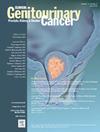局部晚期肾细胞癌生存的种族差异。
IF 2.7
3区 医学
Q3 ONCOLOGY
引用次数: 0
摘要
与其他种族相比,非裔美国人患有肾细胞癌(RCC)的肿瘤往往更具侵袭性,预后更差。种族对局部晚期RCC合并肿瘤血栓和转移性RCC (mRCC)患者生存的影响尚不清楚。本研究评估了带有肿瘤血栓的肾小细胞癌患者生存的种族差异。方法:这项经irb批准的回顾性研究分析了11,520例年龄在18至80岁之间有肿瘤血栓的肾癌患者,他们接受了肾切除术(2010-2015)。包括人口统计学因素(年龄、性别、种族/民族)和临床变量(肿瘤分期、分级、血栓水平、手术类型、合并症)。统计分析采用Kaplan-Meier曲线、Cox比例风险和多项logistic回归,显著性P < 0.05。结果:与非西班牙裔白人(83%)相比,非洲裔美国人(6%的患者)的总死亡率风险高22% (HR: 1.22, P < 0.001),转移性RCC的风险高24% (HR: 1.24, P = 0.019)。晚期血栓水平(I-IV)的5年生存率在不同种族之间具有可比性。总体死亡率为55%,转移病例死亡率上升至82%。结论:在RCC合并肿瘤血栓的患者中,非裔美国患者的死亡率比非西班牙裔白人患者高22%。他们通常表现为局部晚期疾病和mRCC。与白种人相比,非洲裔美国人转移性肾细胞癌的死亡风险增加了24%。研究结果强调了种族对人口统计学的影响,并支持在管理非裔美国患者时的临床考虑。本文章由计算机程序翻译,如有差异,请以英文原文为准。
Racial Differences in Survival for Locally Advanced Renal Cell Carcinoma
Introduction
African Americans with renal cell carcinoma (RCC) often have more aggressive tumors and worse outcomes compared to other racial groups. The impact of race on survival in locally advanced RCC with tumor thrombus and metastatic RCC (mRCC) remains unclear. This study evaluates racial disparities in survival among RCC patients with tumor thrombus.
Methods
This IRB-approved retrospective study analyzed 11,520 RCC patients aged 18 to 80 with tumor thrombus who underwent nephrectomy (2010-2015) using the National Cancer Database. Demographic factors (age, sex, race/ethnicity) and clinical variables (tumor stage, grade, thrombus level, surgery type, comorbidities) were included. Statistical analyses utilized Kaplan–Meier curves, Cox proportional hazards, and multinomial logistic regression, with significance set at P < .05.
Results
African Americans (6% of patients) had a 22% higher overall mortality hazard (HR: 1.22, P < .001) and 24% higher hazard in metastatic RCC (HR: 1.24, P = .019) compared to non-Hispanic Whites (83%). Five-year survival rates for advanced thrombus levels (I–IV) were comparable between races. Overall mortality was 55%, rising to 82% in metastatic cases.
Conclusion
Among patients with RCC and tumor thrombus, African American patients face 22% higher mortality hazard compared to non-Hispanic white patients. They often present with more locally advanced disease and mRCC. The mortality hazard for metastatic RCC is increased by 24% among African Americans compared to Caucasians. The results highlight the demographic impact of race and supports clinical consideration when managing African American patients.
求助全文
通过发布文献求助,成功后即可免费获取论文全文。
去求助
来源期刊

Clinical genitourinary cancer
医学-泌尿学与肾脏学
CiteScore
5.20
自引率
6.20%
发文量
201
审稿时长
54 days
期刊介绍:
Clinical Genitourinary Cancer is a peer-reviewed journal that publishes original articles describing various aspects of clinical and translational research in genitourinary cancers. Clinical Genitourinary Cancer is devoted to articles on detection, diagnosis, prevention, and treatment of genitourinary cancers. The main emphasis is on recent scientific developments in all areas related to genitourinary malignancies. Specific areas of interest include clinical research and mechanistic approaches; drug sensitivity and resistance; gene and antisense therapy; pathology, markers, and prognostic indicators; chemoprevention strategies; multimodality therapy; and integration of various approaches.
 求助内容:
求助内容: 应助结果提醒方式:
应助结果提醒方式:


